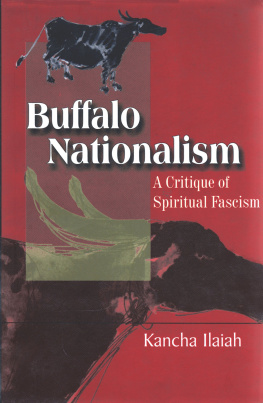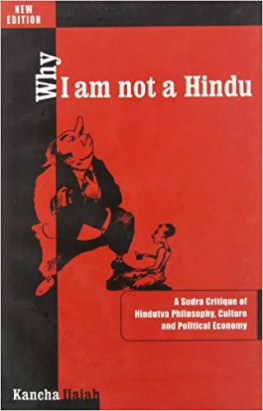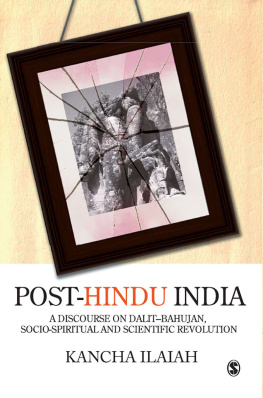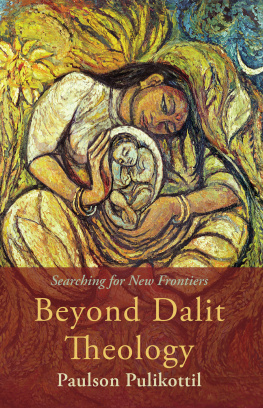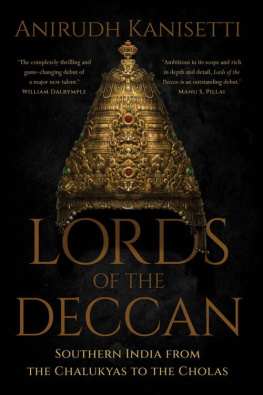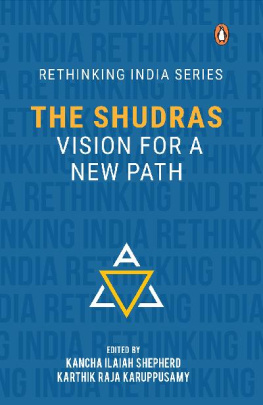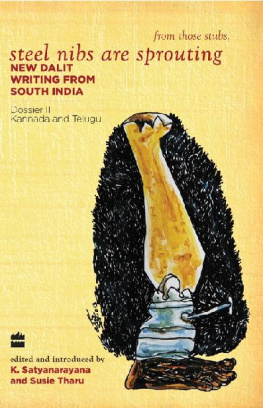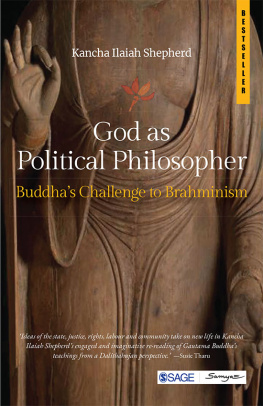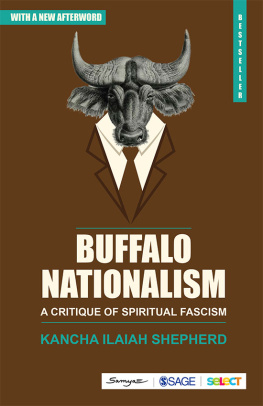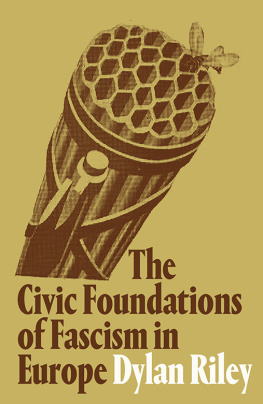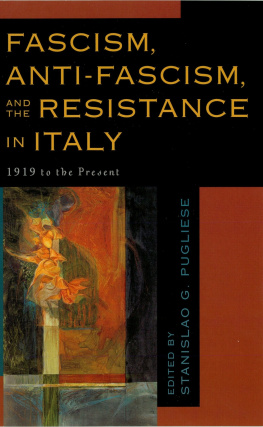Buffalo Nationalism
Kancha IlaiahAlso by the author
WHY I AM NOT A HINDU: A Sudra Critique of Hindutva Philosophy, Culture and Political Economy
GOD AS POLITICAL PHILOSOPHER: Buddhas Challenge to Brahminism
BUFFALO NATIONALISM
A Critique of Spiritual Fascism
KANCHA ILAIAH
BUFFALO NATIONALISM: A Critique of Spiritual Fascism was first published in January 2004 by SAMYA, an imprint of Bhatkal and Sen
16 Southern Avenue, Kolkata 700 026
2004 SamyaISBN 81-85604-69-X
All rights reserved.
No part of this book may be reproduced or utilized in any form or by any means without prior written permission from the publisher.
Distributed by Popular Prakashan Pvt Ltd. Mumbai, Delhi, Kolkata
Typesetting and design by Compuset International 85 Park St, Kolkata 700 016 and printed by Webimpressions (India) Pvt Ltd 34/2 Beadon St, Kolkata 700 006
Published by Mandira Sen for SAMYA, An imprint of Bhatkal and Sen,
16 Southern Avenue, Kolkata 700 026
To all those who have suffered apartheid, untouchability, casteism, patriarchy and brutal atrocities because of
spiritual fascism. To all those who fought, wrote and dedicated themselves for their liberation. Liberation in this world is more important than salvation in heaven.
Acknowledgements
My thanks are due to many institutions, organizations and individuals, who have helped and encouraged me in the course of writing these articles for many newspapers and journals in India. But for the willingness of many editors who allowed me to write, that too in a manner that I wanted to write, which often went against their papers policy, many of these pieces would not have been written at all. Of course, such writing was/is being allowed or asked for because there is a new readership that has emerged from the social womb of DalitBahujans that wants to see its own image in contemporary media. A writers role in a social movement is to reflect its newly made up face and see whether it changes the market value of the mirror itself. But for the positive encouragement of socially sensitive editors like Malini Parthasarathy of The Hindu, A. T. Jayanti of the Deccan Chronicle and my journalist friends like R. Akhileswari, the editor K. N. Shantha Kumar and associate editor A. V. Namboodiri, all of the Deccan Heraldperhaps the only OBC-controlled English newspaperI would not have written these articles. 1 thank them for their support. The late Krishna Raj, editor of the Economic and Political Weekly encouraged my contributions. I deeply regret his untimely death. Sumit Chakravartty of Mainstream also published my writings. I have indeed been fortunate in my association with both these distinguished journals.
The journey of my writing continues. Sometimes some papers close their doors while other new ones open theirs. These encounters of pain and pleasure within the world of the media are part of a writers life. When a writer challenges the world of the press owners caste and class, these problems increase. Rejection of articles, abusive attacks from the anti-Dalit-Bahujan readers follow. If a newspaper publishes my article, I enjoy seeing and reading it like a child enjoys playing with a doll that its own hands have made. I have also received irrevocable rejections. Each has made me stronger rather than weaker. I am thankful to those editorial staff who edited my articles in these newspapers and journals as they improved their readability. I also thank those who rejected my articles as this strengthened my nerve.
After my book Why I am Not a Hindu:A Sudra Critique of Hindutva Philosophy, Culture and Political Economy was published in 1996 (Samya), several reviews appeared and some of the editors of leading national newspapers were willing to publish my opinions on many current issues. Aakar Patel of Mid-Day told me that the book was a modern classic and asked me to write for him. I thank him for the opportunity to do so. I cannot forget the sudden phone call from Malini Parthasarathv, the then executive editor of The Hindu, an English national daily, of one of the largest circulations. She asked me to contribute to The Hinduparticularly to their 50 Years of Independent India special issuein an autobiographical tone, tracing the events in independent India. I did so. That was the beginning of my intellectual engagement with that paper. I thank her for not only publishing many articles, for publishing several critical letters and also for putting up with many abusive letters as well.
In a brahminical environment, publishing my critique of Hinduism in a paper named The Hindu was certainly a tricky proposition and she did so with courage and conviction. I thank her for the risk she had willingly undertaken for an historical task of social transformation. As one of the boldest woman journalists in India she took the initiative to publish caste-related issues and put them up for debate in this country of the casteist elite. The RSS and its sister organizations took up a campaign not only against me but also against all my supporters in the media. Quite interestingly, many of my strong supporters in the media turned out to be women irrespective of their caste background. My publisher Mandira Sen took the initial risk. Then Malini Parthasarathv, A. T. Javanti, Sagarika Ghose, Burkha Dutt (who put me on the NDTV network time and again), Gita Ramaswamy (the publisher of my books in Telugu) all happen to be women. This put a major burden on me of continuing the Phule, Perivar and Ambedkar tradition of the liberation agenda of women along with the liberation of Dalit-Bahujan social forces from caste, gender and class oppression as that is a three-in-one mission of mine too.
Similarly, one day A. T. Jayanti, the editor of the Deccan Chronicle, called me to ask that I write for the newspaper. My articles attracted the most abusive letters from the Hindutva forces, which also pointed to the so-called collusionist approach of Jayanti as well. The Hindutva group have trained an army of letter writers, experts in using abusive language but not reasoned out arguments. Some attacked me in the most abusive language, which Jayanti printed, exposing the vulgarity of Hindutva abusive culture.
The title, Buffalo Nationalism: A Critique of Spiritual Fascism is carved out from the titles of my articles in the Deccan Chronicle. When I wrote the article Spiritual Fascism and Civil Society in the Deccan Chronicle of 15 February 2000, it created a social uproar. The Hindutva forcesincluding some of their central ministers and also the brahminic teaching staff of my universityput pressure on my university to stop me writing. Professor D. C. Reddy, the then vice-chancellor, sent me a letter signed by his Registrar, Pannalal:
This is with reference to some of your writings in popular newspapers. In your article Spiritual Fascism and Civil Society, Deccan Chronicle, 15 February 2000, you have elaborated on Caste System in our country. As is well known to you the problems existing in society can always be viewed at from different perspectives and several actions can be initiated to eliminate/mitigate such social problems. Writing articles and debating on such issues is definitely an accepted Way in a civil society. While doing so, it is absolutely essential to bind ourselves within the basic canons of conduct of our profession.
Basically being teachers, we are bound to contribute towards upliftment promote social harmony and emotional integration. We have to positively ensure that either our writings or any other action do not in any way lend a slant to accentuating exiting prejudices and inflame hatred ... You are requested to keep these in mind and discharge a role as a teacher with greater vigour and vitality to the betterment of the society as a whole.

